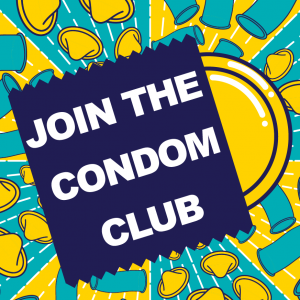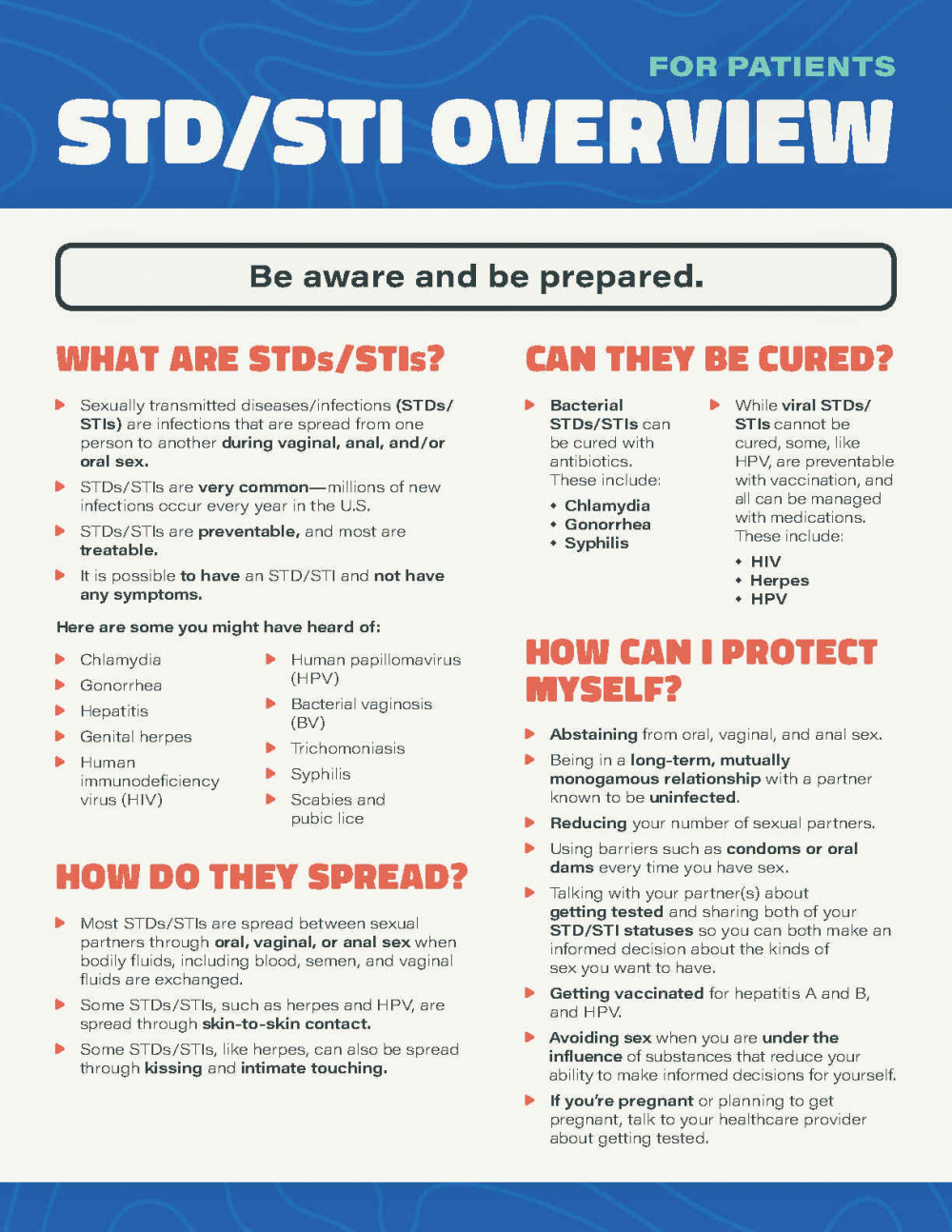Contact Health Promotion
FREE HIV Testing 11:00am-2:00pm
- Wednesday, 02/11/26, Health Promotion Office (Part of Get Yourself Tested Day)
- Tuesday, 03/03/26, Office of Inclusion, Union Fieldhouse
- Wednesday, 04/08/26, Health Promotion Office
Health Promotion
Sexual health
Sexual Health plays a crucial role in the overall health and well-being of all individuals regardless of if someone is sexually active or not. Strengthening your knowledge on sexual and reproductive health empowers you to make healthy decisions and advocate for yourself.
The World Health Organization defines sexual health as:
- A state of physical, emotional, mental and social well-being in relation to sexuality
- Not merely the absence of disease, dysfunction or infirmity
- Requires a positive and respectful approach to sexuality and sexual relationships
- Having the possibility of pleasurable and safe sexual experiences, free of coercion, discrimination and violence
- For sexual health to be attained and maintained, the sexual rights of all persons must be respected, protected and fulfilled
Sexual Health Programs

Get FREE barriers each semester. We offer dental dams, latex condoms (internal and external), non-latex condoms, XXL condoms, and lube! Sign up is quick and easy.

Want to be a sexpert? Work through this online module to learn the ins and outs of healthy relationships, safer sex practices, consent and communication, and birth control information.
Be informed about your sexual health. It is your sex life…stay up-to-date and be healthy. Expand each section below to learn more.
Understanding Sexual Health Accordion Closed
Sexuality is a term that encompasses a variety of behaviors, identities, personal beliefs, desires, and values. It is so much more than just having sex! A sexually healthy individual should remember that there is no “right” or “wrong” way to define sexuality, rather it is:
- How someone engages in sexual activity.
- Sexual preference in how they have sex or with whom.
- How someone identifies themselves (gender identity, gender roles, sexual orientation).
- How you feel about your body.
- Sexual experiences, including intimacy, passion, fantasies, thoughts, and ideas.
Sex is the term that defines humans as female or male (i.e., sex assigned at birth). In society, sex typically refers to consensual physical intimacy between adults, but definitions vary. It’s important to note that various acts can be considered sexual, such as:
- Kissing & Touching or massaging (which can include body parts or sexual organs)
- Oral sex
- Vaginal sex
- Anal sex
- Sex with toys
- Masturbation
- And more!
If you choose to have sex, there are ways to protect yourself and your partner by prioritizing safer sex practices.
Expanding your sexual health knowledge is very important if you choose to engage in sexual activity or are looking to learn more prior to having sex. Learn more by following the links below to support your sexual health and wellness.
- American Sexual Health Association (Safer Sex Toolbox)
- CDC Sexual Health Webpage
- A Guide for Young People- Sexuality and Mental Health
- Human Rights Campaign Resource Page
- U.S. Department of Health and Human Services- Office on Women’s Health
- Trans Student Educational Resources
- Men’s Health Network
- Sexplanations with Dr. Lindsey Doe – Clinical Sexologist
Contraception Methods Accordion Closed
When deciding which contraception (birth control) method to utilize in your own life, it is important to complete a few steps to help point you in the right direction to protect yourself from unwanted pregnancy.
- Schedule an appointment with NAU Campus Health Services and speak with a provider to see which method best fits your lifestyle.
- Visit the BEDSIDER website to explore different types of contraception methods.
- Visit the Planned Parenthood website to learn how to make the best choice for you. Various methods are available for use that fall under three separate categories. Familiarize yourself with the different methods to prevent unwanted pregnancies.

*Please note, physical barriers are the only method that protects against pregnancy AND sexually transmitted infections*
Physical Barriers Accordion Closed
Physical Barriers (besides abstinence) are the only type of contraceptives to protect against both sexually transmitted infections and unplanned pregnancies. They protect you from fluids that can be transmitted during sexual activity which can cause unwanted infections.
To learn more about the different types of condoms available, check out the following webpages to strengthen your knowledge!

If you are looking for free physical barriers throughout the semester, join the Condom Club!
Watch this video for a walk-through of how to appropriately use a physical barrier!
Sexually Transmitted Infections (STIs) and Testing Accordion Closed
What’s the data telling us?
Sexually Transmitted Infections (STIs) continue to be on the rise nationally and in the state of Arizona. According to the Arizona Department of Health Service’s Office of STI Control, the 2022 Annual STI Report has determined that “Youth 15 through 24 years old” make up 47% of new STI cases reported in Arizona.
Chlamydia and Gonorrhea continue to be the top two infections reported, accounting for 94% of new STI cases, according to the annual report.
STI facts:
- Many STIs have no symptoms. You can’t tell if someone has an STI just by looking at them.
- By the age of 25, roughly one in two sexually active people will get an STI.
- Only about 40% percent of college students use condoms during vaginal sex, even fewer with oral or anal sex.
- College students under the influence of alcohol or other drugs are more likely to engage in high-risk behavior that can increase their chances of having an STI.
- The only way to find out if you have a Sexually Transmitted Infection (STI) is to get tested!
High-Risk Behaviors that can put you at risk:
- Anal, vaginal, or oral intercourse without protection
- Having multiple sex partners
- Having anonymous sex partners
- Being under the influence of drugs or alcohol, which can lower your ability to make sound decisions.
- Being 25 years and younger.

Looking for STI Testing? Check out these clinic options (Prices vary by clinic)
NAU Campus Health Services: 928-523-2131
- $45 Express Collect (Chlamydia and Gonorrhea testing only. Schedule an appointment here.
- Free HIV Testing Clinics in partnership with Coconino County! Check out our events calendar for upcoming events.
Coconino County Clinic: 928-679-7272
Planned Parenthood: 855-207-7526 North Country Health Care: 928-522-1300
HIV and PrEP Accordion Closed
What is HIV?
HIV (human immunodeficiency virus) is a virus that attacks the body’s immune system, making a person more vulnerable to other infections and diseases. If left untreated, can develop into AIDS (acquired immunodeficiency syndrome).
HIV is treatable but not curable. With proper treatment, symptoms can be controlled and people living with HIV can live long, healthy lives while protecting their partners!
How’s it Transmitted?
You can get HIV by coming into contact with certain body fluids from a person diagnosed with HIV who has a detectable viral load (the amount of virus circulating in your body).
Common fluids are:
- Blood · Semen (cum) and pre-seminal fluid (pre-cum)
- Rectal Fluids
- Vaginal Fluids
- Breast Milk
What is HIV Viral Load?
HIV viral load is the amount of virus that can be found in the body of someone who is living with HIV. When someone’s viral load is up, they are more likely to infect others. What is
Antiretroviral Therapy (ART)
For people diagnosed with HIV, they are treated with medications prescribed by a healthcare provider that suppresses (lowers/reduces) HIV viral load. People living with HIV can live long and healthy lives if they take their medications as prescribed.
What is U=U?
Undetectable = Untransmittable (U=U) is a scientifically proven statement that means that if someone takes their ART as prescribed, they can progress to the point that their viral load is so low there is no risk of infecting partners through sex (oral, anal, or vaginal).
Living with HIV
Remember, you are not alone, and there are resources available to help you navigate life if you are living with HIV. Follow these steps to support your well-being:
- Establish care with an HIV Care Provider
- Begin antiretroviral therapy (ART) promptly and take medication as prescribed.
- Attend regular medical check-ups and follow your treatment plan.
- Get screened regularly for other sexually transmitted infections.
- Maintain open communication with partners.
Pre-exposure Prophylaxis (PrEP) and Post Exposure Prophylaxis (PEP)
PrEP is a medication that reduces your chances of getting HIV from sex or injection drug use. When taken as prescribed, PrEP is 99% effective at preventing HIV.
- Options include a daily pill or injectable medication.
PEP is a short course of medication taken to prevent HIV after a potential exposure.
- Must be taken within 3 days (72 hours) following a potential exposure, or it won’t work. Every hour counts!
- PEP should be used only in emergency situations. It is not meant for regular use by people who may be exposed to HIV frequently.
- Once prescribed, you will be given a course of HIV medications to take daily for 28 days and then scheduled for follow-up testing.
For more information on how to support your sexual health and protect yourself against HIV, follow the links below!
- Schedule an appointment with NAU Campus Health Services and speak with a provider.
- Coconino County HIV Case Management (Ryan White Program)
- www.HIV.gov
